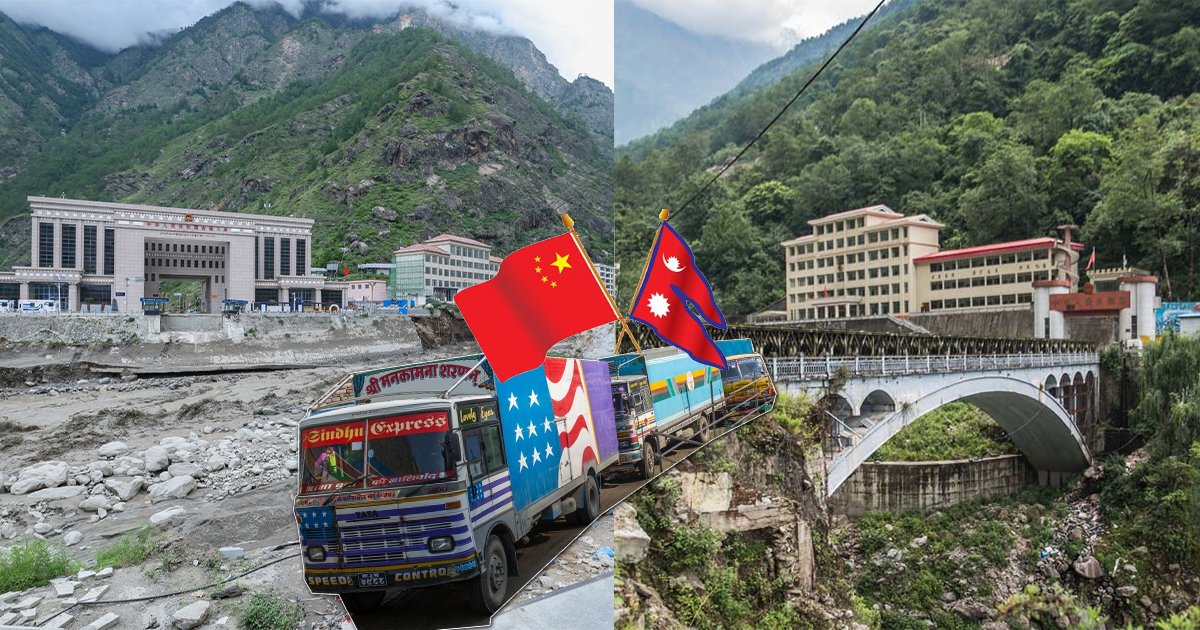Kathmandu: Ahead of Nepal’s major festive season, nearly 1,900 cargo containers filled with festival-targeted goods remain stranded in China due to the closure of two key northern border points, Rasuwa and Tatopani.
Nepali traders had imported consignments in preparation for Teej, Dashain, and Tihar, which should have reached markets across the country by early August. However, the goods remain stuck on the Chinese side as Rasuwa has been fully shut down since late June, and Tatopani faces recurring landslides and road collapses triggered by monsoon rains.
Traders under pressure
Ram Hari Karki, president of the Nepal Himalaya Cross-Border Commerce Association, said Tatopani cannot be relied upon.
“Even a light rain causes road subsidence and landslides along the Tatopani route. Roads repaired during the day collapse at night,” Karki told Clickmandu. “Business priorities had shifted to Rasuwa, but with Rasuwa completely blocked and Tatopani unstable, traders are under severe strain.”
Over 70 percent of Nepal–China trade in recent years had been conducted via Rasuwa. Now, business groups warn it could take years to restore the same level of activity.
Containers stranded in China
According to Karki, more than 500 containers loaded with festival goods are stranded in Kerung after floods washed away the Friendship Bridge and road links at Rasuwa. Another 1,400 containers remain stuck along the Lhasa–Nyalam route due to Tatopani disruptions.
The 1,900 containers carry goods worth an estimated Rs 35 billion (about US$ 260 million), including fruits, garlic, footwear, readymade garments, light jackets, belts, watches, sports items, cosmetics, fabrics, quilts, decorative lights, and electronic appliances.
“Rerouting Kerung containers via Tatopani would increase costs by 10 percent and add at least two days,” Karki said. “But Tatopani itself is unreliable. At this rate, the chance of festival goods arriving in Nepali markets before Dashain is only 1 percent.”
Hem Lal Kharal, president of the Nepal National Traders’ Association, noted that Teej consignments missed the festival altogether, forcing traders to sell leftover stock from previous years.
Dashain, Tihar, and Chhath are traditionally peak seasons for Nepali traders, when otherwise slow markets see a boom, accounting for nearly 35 percent of annual economic turnover.
Economic ripple effect
Dashain, Tihar, and Chhath are traditionally peak seasons for Nepali traders, when otherwise slow markets see a boom, accounting for nearly 35 percent of annual economic turnover. Business leaders fear this year’s markets will remain sluggish due to shortages.
With roads blocked, only perishable fruits are being carried into Nepal manually by porters from stranded containers. Other goods remain stuck. Shipping via Indian seaports to Birgunj or Biratnagar is technically possible, but unaffordable for small and medium traders, who account for about 95 percent of border trade. The sea route would also add at least two months to delivery times.
If the consignments do not arrive before the upcoming Dashain, traders plan to release them for sale during next year’s festivals. Many businesses had borrowed heavily from banks to finance these imports and now face difficulties repaying loans and interest.
Flood damage and delayed repairs
On June 24, massive flooding in Tibet’s Lhende River destroyed the Rasuwa border link, including the Friendship Bridge and a nearly completed dry port. A second flood on July 29 caused further damage. Currently, no road connects Rasuwa to China.
Nepal’s Consul General in Lhasa, Laxmi Niraula, said China has been attempting to build a temporary bailey bridge with hume pipes, but repeated floods have washed away construction materials. “Even with work at a war footing, persistent rain and floods have delayed progress,” he said. “At least a month of dry weather would be required to complete the repairs.”
Tatopani’s instability
Former president of the Cross-Border Trade Association, Ashok Shrestha, said traders had already shifted reliance from Tatopani to Rasuwa due to Tatopani’s chronic landslide risks. The Ministry of Industry, Commerce and Supplies also considers Rasuwa the more reliable trade route, reconstructed with Chinese assistance in 2020.
Government data shows that in the last fiscal year (2024/25), Nepal imported goods worth Rs 85.23 billion through Rasuwa, nearly double Tatopani’s Rs 50.39 billion. Nepal also managed minor exports to China via Rasuwa, while Tatopani recorded none.
Outlook
For now, Nepal’s festive markets are set to face shortages. Traders warn that unless border routes are restored, the economic blow will extend beyond this season, affecting national trade flows, small businesses, and consumer confidence.



Comment Here